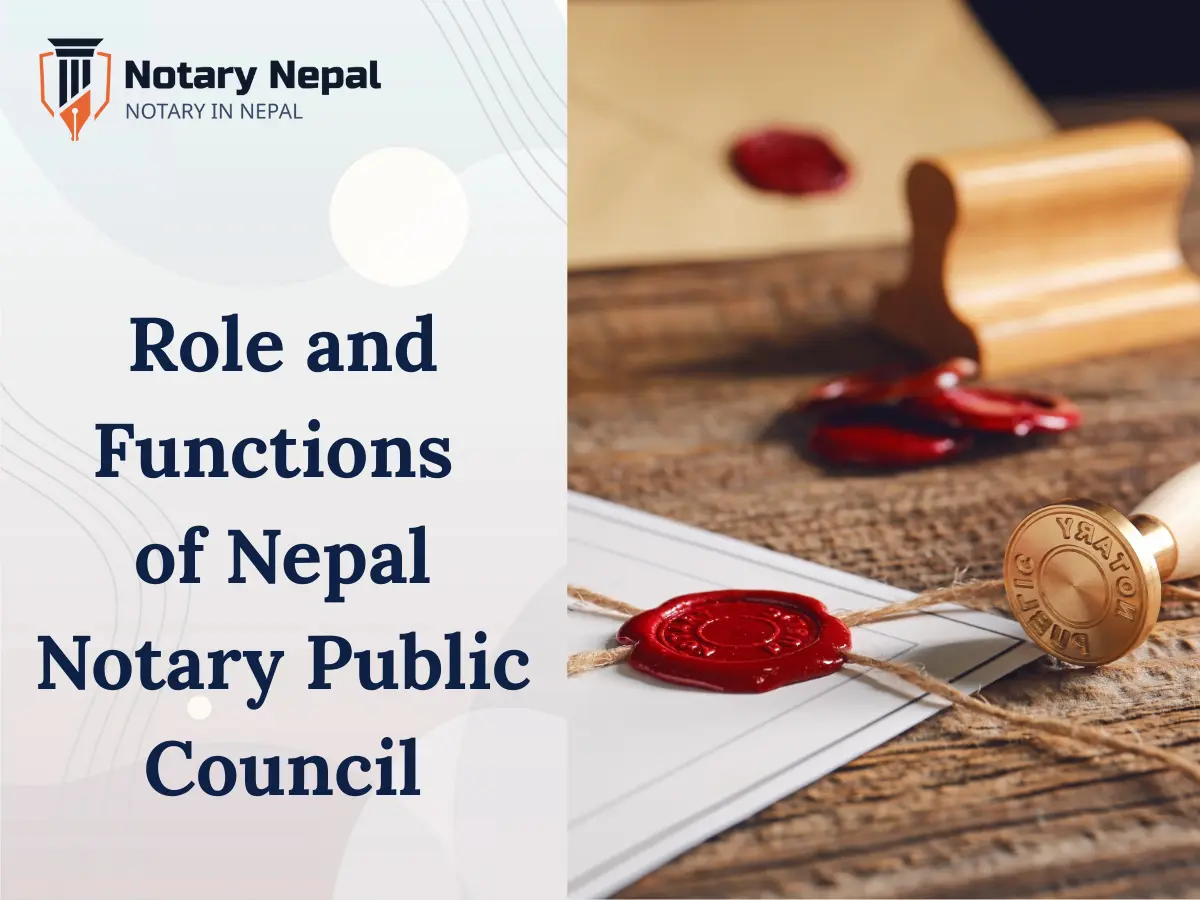

Table of Contents
Background and Legal Foundation
Before the enactment of the Notary Public Act, 2063 B.S. (2006 A.D.), Nepal lacked a defined legal structure for document certification, attestation, and translation. These responsibilities were previously handled by government officials or the Law Book Management Committee, often resulting in inconsistencies and delays. The introduction of the Notary Public Act sought to resolve this gap by establishing clear legal processes and empowering a dedicated regulatory authority to oversee the notarial system across the country.
The Act also provided a mechanism for document translation and validation—an essential service in a multilingual society and for Nepali citizens engaging internationally. The overarching goal was to ensure legal transparency, accountability, and ease of access for the public.
Formation of the Nepal Notary Public Council
The Nepal Notary Public Council was formally established through the Notary Public Act, 2063, certified on Ashoj 28, 2063 B.S. (October 11, 2006), and enforced from Falgun 1, 2063 B.S. (February 3, 2007). To complement the Act, the Notary Public Rules, 2063 B.S., were brought into effect on Chaitra 14, 2063 B.S. (March 28, 2007), and have since been amended three times to reflect evolving legal needs.
According to Section 5(1) of the Act, the Council comprises a strong legal panel:
Attorney General – Chairperson
President, Nepal Bar Association – Member
Secretary, Ministry of Law, Justice and Parliamentary Affairs – Member
Secretary, Office of the Prime Minister and Council of Ministers – Member
Secretary, Nepal Law Commission – Member
Secretary, Ministry of Land Reform and Management – Member
Secretary, Ministry of Foreign Affairs – Member
Registrar, Supreme Court – Member
Initially operated from the Attorney General’s Office, the Council moved to Kupandol, Lalitpur, in Baishakh 2067 B.S. (2010 A.D.) due to a growing number of notaries.
Duties and Responsibilities of the Council
The Nepal Notary Public Council is an autonomous, perpetual institution tasked with maintaining the integrity, reliability, and accessibility of notarial services across Nepal. Its core functions include:
1. Policy Formulation and Implementation
The Council creates policy frameworks that govern notarial practices throughout the country.
2. Certification Distribution
It issues certificates to qualified individuals, allowing them to operate as notaries or legal translators.
3. Examinations and Training
The Council conducts rigorous examinations for prospective notaries, evaluates qualifications, and provides training to ensure professionalism and ethical conduct.
4. Monitoring and Compliance
Regular inspections and compliance checks are carried out to ensure adherence to legal guidelines and ethical codes of conduct.
5. Committee Formation
The Council has the authority to form various committees, including investigation and disciplinary committees.
6. Complaint Handling
Citizens and legal entities can file complaints, which the Council investigates, ensuring accountability among notary professionals.
7. Public Access and Awareness
The Council updates its services and regulations online, making information transparent and accessible to the general public.
8. Technology and Innovation
Software and systems are developed to verify the legitimacy of notary stamps and digital documents, supporting Nepal's digital transformation in legal processes.
Structure and Key Members
The Nepal Notary Public Council is chaired by the Attorney General of Nepal and includes key legal stakeholders, offering a blend of judicial oversight and policy enforcement. The secretariat coordinates administrative tasks, while the council structure allows for inter-ministerial cooperation. This approach ensures comprehensive oversight across various sectors where notarization and translation are required.
Licensing, Training, and Certification
To become a certified notary in Nepal, candidates must:
Meet the eligibility requirements outlined in the Notary Public Act
Pass a written examination conducted by the Council
Attend mandatory training sessions
Certified notaries must renew their licenses periodically and adhere to a strict code of conduct. Any negligence or breach can lead to disciplinary actions or revocation of certification.
The Council also facilitates training for document translation, a growing need in Nepal due to its increasing global interactions.
Monitoring, Ethics, and Public Complaints
The Council enforces ethical practices by introducing a standard Notary Code of Conduct. Monitoring mechanisms include:
Annual performance reviews
Surprise audits
Digital reporting requirements
Complaints against a notary—ranging from malpractice to delays—are handled systematically. Investigation committees look into such matters, and disciplinary measures may involve suspension or revocation.
Public Awareness and Online Services
In an effort to modernize, the Council:
Launched an online portal for notary registration, document submission, bank guarantee updates, and license renewals
Regularly updates citizens about procedural changes, examination schedules, and policy amendments
Hosts public awareness campaigns in collaboration with the Nepal Bar Association and NGOs
This digitization has made the notary process transparent, convenient, and accessible for both professionals and the public.
Future of Notary Services in Nepal
With globalization and increasing demand for international documentation, the role of the Nepal Notary Public Council is more crucial than ever. The Council plans to:
Expand training programs in collaboration with international bodies
Enable blockchain-based document verification
Offer multilingual certification services
Promote international standardization in legal translations
Strengthen cross-border cooperation with notary councils in other countries
Conclusion
The Nepal Notary Public Council plays a foundational role in the country’s legal system. From certifying notaries to regulating translation services and enforcing legal conduct, the Council ensures that document authentication remains robust, trustworthy, and aligned with both national and international standards.
For professional assistance with notary public services, translations, affidavits, certifications, or legal documentation, visit Notary Nepal — your trusted partner for secure and verified documentation.
Explore Related Services by Notary Nepal:
Call or WhatsApp: +977 9765979296
Email: info@notarynepal.com
Notary Nepal – Trusted for Notarization, Certified Translations, and Legal Support.
This article is for informational purposes only and does not constitute legal advice, advertisement, or solicitation. Notary Nepal and its team are not liable for any consequences arising from reliance on this information. For legal advice, please contact us directly.


